Bb2.9
The beginning of glyph line Bb2 coincides with the Rain star (Matar)
η
in Pegasus, 3 days after the Hero (Homan,
ζ).
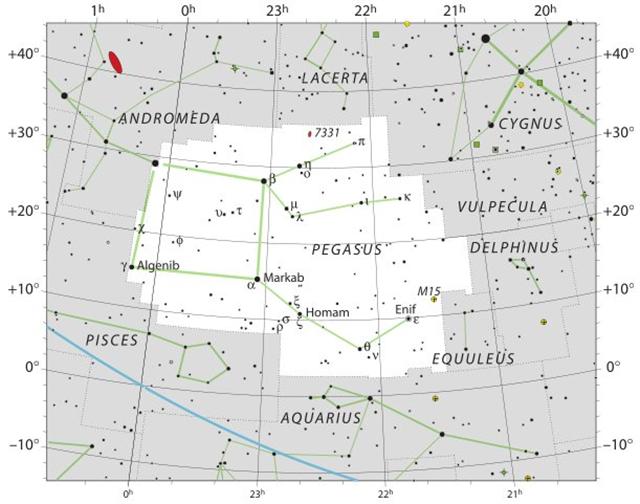
...
Zayin
(also spelled Zain or Zayn or simply Zay)
is the seventh letter of many Semitic abjads ... It represents
the sound [z]. The Phoenician letter
appears to be named after a sword or other weapon. (In Biblical
Hebrew, 'Zayin' means sword, and the verb 'Lezayen'
means to arm. In modern Hebrew, 'zayin' means penis and 'lezayen'
is a vulgar term which generally means to perform sexual
intercourse and is used in a similar fashion to the English word
fuck, although the older meaning survives in 'maavak mezuyan'
(armed struggle) and 'beton mezuyan' (armed, i.e.,
reinforced concrete). The Proto-Sinaitic glyph according to
Brian Colless may have been called ziqq, based on a
hieroglyph depicting a 'manacle'
...
... The letter shape ultimately goes back to a hieroglyph for
'courtyard' ... possibly named
hasir in the Middle Bronze Age alphabets, while the name
goes rather back to
hayt [→
haut], the name reconstructed for a letter derived
from a hieroglyph for 'thread' ...
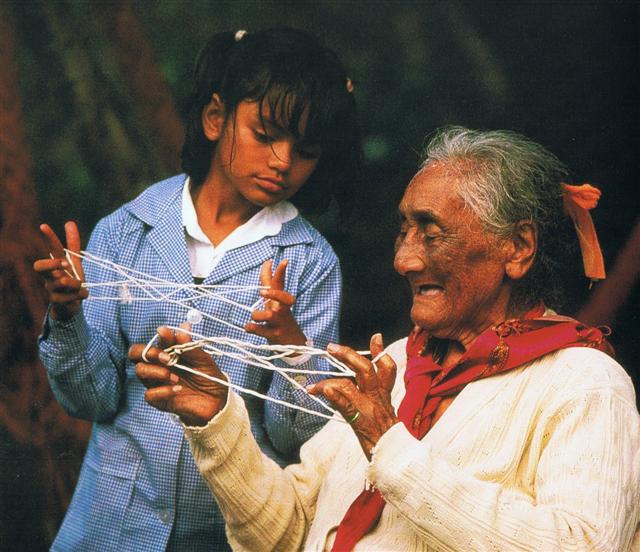
...
string games could be
resumed after it was clear that the Sun had managed to leave the
horizon and was rapidly gaining in altitude: 'Before the sun
starts to leave the horizon ... when it shows only on the
horizon ... then string games were no longer allowed as they
might lacerate the sun. Once the sun had started to go higher
and could be seen in its entirety, string games could be
resumed, if one so wished. So the restriction on playing string
games was only applicable during the period between the sun's
return and its rising fully above the horizon ...

The star named Unarmed (Al-araph,
β Virginis) was 166 days earlier.
 |
464 |
 |
|
Ba1-4 |
Bb2-17 (469 = 104 + 365) |
|
CAPELLA (*78) |
DENEBOLA (*178) |
|
June
7 (158) |
Sept
15 (258, 623) |
|
"April 27 (117 = 158 - 47) |
"Aug
5 (217, 582) |
|
APRIL
4 (94 = 158 - 64) |
JULY 13
(194, 559) |
|
 |
*166 |
 |
|
Ba3-17 (104 =
4 + 100) |
Bb2-1 (453 =
469 - 16) |
|
ALARAPH
(*178) |
MATAR (*344 =
*178 + *182 - *16) |
|
Sept 15 (258 =
242 + 16) |
Aug 30 (242 = 258 - 16) |
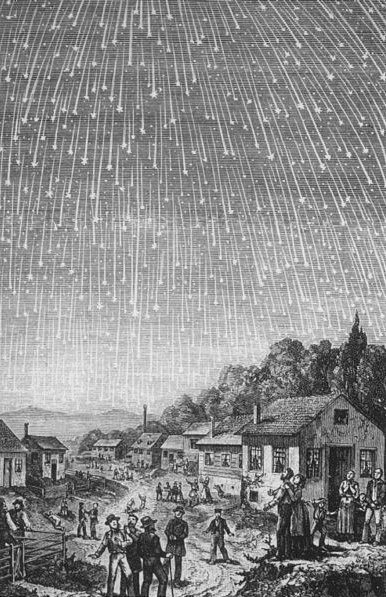
 |
 |
 |
 |
 |
 |
 |
|
421 + 29 =
450 |
Bb1-30 (11 *
41) |
Bb1-31 (452) |
Bb2-1 (32) |
Bb2-2 (227 *
2) |
Bb2-3 (455) |
Bb2-4
(19 * 24) |
|
kukurutou - kua
mai ïa - ki to vero |
kua haga i te
mea ke |
e kua mea i te
mea ke |
Parei |
e
niu - tapatu -
kua hua ko te kava |
|
Tou.
In ancient times, a tou was someone who
had recovered from an epidemic, but whose
illness meant that someone else in the family
had to die. The tou were regarded as
portents of evil. Toutou, lush; fertile
(land). Toûa: Egg yolk; the colour
yellow; soft, fibrous part of tree bark; toûa
mahute, mahute fibres. Vanaga. Toua:
Wrath, anger, rage, revenge, battle, combat,
debate, dispute, dissension, uprising, revolt,
quarrel, fight, hostility (taua); toua
rae, to provoke, rae toua, to open
hostilities, toua kakai, to rebuke,
tuki toua, to stir up dissension; totoua,
hostility; hakatoua, fighter, warrior. P
Mgv.: toua, war, battle. Mq.: toua,
war, dispute, quarrel. The form with o is
found only in these three languages, taua
is found in the general migration, Rapanui is
the only speech which has both. Toutou,
fertile (tautau); hakatoutou, to
fertilize. Mq.: taútaú, fertile.
Toùvae, to run; hakauruuru toùvae,
id.
Churchill.
Vero.
To throw, to hurl (a lance, a spear).
This word was also used with the particle kua
preposed: koía kua vero i te matá, he is
the one who threw the obsidian [weapon].
Verovero, to throw, to hurl repeatedly,
quickly (iterative of vero). Vanaga. 1.
Arrow, dart, harpoon, lance, spear, nail, to
lacerate, to transpierce (veo). P Mgv.:
vero, to dart, to throw a lance, the
tail; verovero, ray, beam, tentacle. Mq.:
veó, dart, lance, harpoon, tail, horn.
Ta.: vero, dart, lance. 2. To turn over
face down. 3. Ta.: verovero, to twinkle
like the stars. Ha.: welowelo, the light
of a firebrand thrown into the air. 4. Mq.:
veo, tenth month of the lunar year. Ha.:
welo, a month (about April). Churchill. Sa.:
velo, to cast a spear or dart, to spear.
To.: velo, to dart. Fu.: velo,
velosi, to lance. Uvea: velo, to
cast; impulse, incitement. Niuē:
velo,
to throw a spear or dart. Ma.: wero,
to stab, to pierce, to spear. Ta.:
vero, to dart
or throw a spear. Mg.: vero,
to pierce, to lance. Mgv.: vero,
to lance, to throw a spear. Mq.: veo,
to lance, to throw a spear. Churchill 2.
Pare.
Half raw, badly cooked. Parehaoga,
food prepared in the earth oven (umu
parehaoga) for a feast or for people whose
help is needed for some work or for organizing a
feast. Parehe, piece, bit; to fall, break
into pieces. Parei, dirty, to have a
dirty face and eyes, someone who gets up without
washing. Parera, sea bottom. Vanaga. Ta.:
Pare, a fort, a place of refuge. Ma.:
parepare, a breastwork in a stockade. Mgv.:
Pare, a covering for the head. Mq.:
pae, id. Sa.: pale, id. Ma.: pare,
id. Churchill. Parehe, to break, a crack.
Parei, 1. (paré), dressed up. 2. To
sparkle (of the eyes). Parera, 1. A
shallow, a reef. 2. Deep water, profound, gulf;
parera tai, deep sea; tai parera,
high tide; hohonu parera, fathomless,
unsoundable. 3. To lead astray. Hakaparera,
to frighten, to scare. Pareu, skirt,
apron. Mgv., Mq., Ta.: pareu, loincloth,
apron. Pau.: Parego, to drown oneself.
Ta.: paremo, drowned. Ma.: paremo,
id.
Tapa.
1. Side, corner, edge;
he-hakarere a te tapa, to leave aside,
to abandon; a te tapa mata'u o te haga,
on the right-hand side of the bay. 2.
Tapa mahute, piece of mahute
material; this term is very common nowadays,
but it seems probable that it was borrowed
from the Tahitian in replacement of
parehe mahute. 3. To recount the
years, the months; to recount happenings of
many years ago, in verses called manu,
in which a murderer confided his crime
to his victim's relatives; the murderer
himself asked a brother or a friend to
compose those verses: e tapa koe itooku
manu, compose my manu. The
expression tapa ite manu was also
used of a group of people expressing the
desire to kill someone. 4. Tagata tapa
ta'u, according to traditions, this term
referred to the scribes who recorded births
on the tablets. Vanaga. 1. Border, fringe,
edge, groin, cloth, clothing, dress,
garment. Tatapa, lateral, bank.
Tapatapa, edge. P Mgv.: tapa, the
edge of the bast cloth, bast cloth in
general. Mq.: tapa, fringe, cloth. 2.
To name, to mention, to count, to calculate,
to reckon, to number, to figure up, to
recapitulate; tapa ki te igoa, to
take a census; tapa igoa, list.
Tatapa, to count, to number, to reckon.
Tapatapa, to mention. P Mgv.: tapa,
to give a pet name. Mq.: tapatapa, to
recite, to invoke; tatapa, to take
the name of some one, to announce by name.
Ta.: tapa, to call by name.
Churchill. Mq.: Tapaau, coconut leaf
plaited to serve as a mat. Sa: tapa'au,
a coarse coconut leaf mat. Tapatai, a
dweller on the strand. Ma.: tapatai,
beach. Churchill.
|
|
VISIBLE CLOSE
TO THE FULL MOON: |
|
υ Oct. (341.0), α/91 Lac. (341.1),
HOMAN (Hero) = ζ Pegasi,
β Piscis Austrini (341.2), ν Tucanae (341.5),
υ Aquarii
(341.9) |
η Aquarii
(342.1),
σ
Gruis (342.4),
SITULA
(Water-jar) = κ Aquarii
(342.7)
*301.0 = *342.4 - *41.4 |
ε Piscis Austrini (343.5), ο Pegasi, β Gruis
(343.8) |
ρ Gruis (344.0),
MATAR (Rain) =
η Pegasi
(344.2), η Gruis (344.6), β Oct. (344.7) |
λ Pegasi (345.0), ξ Pegasi (345.1), ε Gruis
(345.3), τ Aquarii (345.7), ξ Oct. (345.8), μ
Pegasi (345.9) |
ι Cephei (346.0), λ Aquarii, γ Piscis Austrini,
σ Pegasi (346.5) |
SCHEAT AQUARII = δ
Aquarii
(347.0),
ρ
Pegasi (347.2),
δ
Piscis Austrini (347.4),
FOMALHAUT (Mouth of the Fish) =
α
Piscis Austrini,
τ
Gruis (347.8)
*306.0 = *347.4 - *41.4 |
|
Febr 25 (421) |
26 (396 + 26) |
(31 + 27 =
58) |
28 (360 + 64) |
(360 + 65) |
(360 + 66) |
(360 + 67) |
|
INVISIBLY
CLOSE TO THE SUN: |
|
Aug 27 (239) |
28 (422 -
182) |
29 (58 + 183) |
30 (242) |
31
|
Sept 1 |
Hora Nui 2 |
|
... he oho.mai te miro. o Hotu.mai maori.ki te
pito o te kainga. i te
porua o te raa. o hora nui.i oho mai. ai
... [E:74
→ *74] |
|
p Carinae (159.3) p Carinae (159.3) |
φ Hydrae (160.3) |
No star listed (161 →
φ) |
VATHORZ POSTERIOR = θ Carinae
(162.1),
PEREGRINI = μ Velorum,
η Carinae
(162.6) |
ν Hydrae (163.1) |
No star listed (164)
ALTAIR (α
Aquilae) |
Wings-27 (Snake)
η
Octans (165.4),
ALKES (Shallow Basin) =
α
Crateris
(165.6)
*124.0 = *165.4 - *41.4 |
|
Corresponding
right ascension days in the Golden Age of the
Bull: |
|
X-MAS EVE |
(359 = 423 - 64) |
26 (177 +
183) |
27 |
28 |
29 (363) |
DEC 30 |
|
ST JOHN'S DAY |
25 (176) |
26 (6 * 29½) |
27 (2 * 29) |
28 |
29 (180) |
JUNE 30 |
When in September 2 (245 = 490 / 2
→ Bb2-38) the Sun reached the empty and dry
shallow basin Al-kes it should have reminded
people of JUNE 30 (181 = 245 - 64).
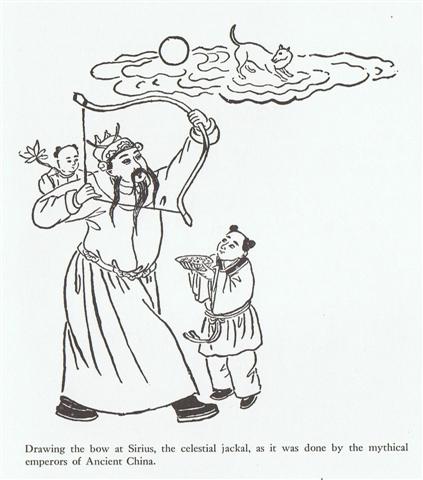
And in the next day
a new half-year might then be expected to begin. However, the
B text seems to indicate there first had to be a week
for the wake (→ vacuum)
left by the ship.
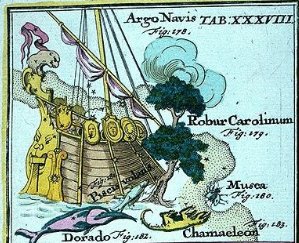
...
The Celtic year was divided into two halves with the
second half beginning in July, apparently after a
seven-day wake, or funeral feast, in the oak-king's
honour ...
Possibly the word
kokore used by Metoro in his
te marama etahi
rua kokore meant there was no taboo in place during
these nights.
 |
 |
 |
 |
 |
 |
 |
|
(36 =
100 - 64) |
(421
+ 37 = 458) |
Bb2-7 |
Bb2-8
(460) |
Bb2-9 |
Bb2-10 (462) |
Bb2-11 (42) |
|
e tagata
moe mai |
ki te marama
etahi rua kokore |
ku ihi a mai - ki te
marama |
eaha te marama |
kua
moe te goe
ra |
ki te ika hiku
raverave |
|
Kore. To lack, to
be missing; without (something normally
expected), -less; ana kore te úa, ina
he vai when rain lacks there is no
water: vî'e kenu kore, woman
without a husband, i.e. widowed or
abandoned by her husband. Vanaga. Not,
without (koe); e kore, no,
not; kore no, nothing, zero;
kore noa, never, none; hakakore,
to annul, to nullify, to annihilate, to
abrogate, to acquit, to atone, to
expiate, to suppress, a grudge. T Pau.:
kore, not, without. Mgv.: kore,
nothing, not, without, deprived of;
akakore, to destroy, to annihilate.
Mq.: kore, koé, óé,
nothing, not, finished, done, dead,
destroyed, annihilated, without. Ta.:
ore, no, not, without. Korega,
nothing, naught. Churchill.
Ihi. 1. Line of
singing women at a feast or an êi.
2. Ihi, ihi-ihi, to break
up into small pieces, to crumble, to
tear to pieces; he-ihi i te maúku,
to separate fibres. Vanaga.
Ihiihi, to hop. Churchill.
Goe. Milky Way.
Vanaga.
 |
39 |
 |
3 |
 |
26 |
 |
2 |
 |
|
Ba6-3 (210) |
Ba6-43 |
Ba7-3 (254) |
Ba7-30 |
Ba7-33 (284) |
|
SIRIUS (*101) |
AL MINHAR AL ASAD (*141) |
ALKES (*145) |
*355 |
MANUS CATENATA (*358) |
|
45 |
30 |
|
|
VISIBLE CLOSE TO THE FULL MOON: |
|
FUM AL SAMAKAH (Mouth of the Fish) =
β
Piscium
(348.3),
ζ
Gruis (348.5),
ο
Andromedae (348.9) |
Al Fargh al
Mukdim-24 (Fore Spout) /
Purva
Bhādrapadā-26 (First of the Blessed
Feet) /
House-13 (Pig)
SCHEAT PEGASI =
β
Pegasi,
π
Piscis Austrini (349.3),
κ
Gruis (349.4),
MARKAB PEGASI =
α Pegasi
(349.5)
*308.0 = *349.4 - *41.4 |
23h (350.0 = 167.4 + 182.6)
υ, θ Gruis (350.0), π Cephei (350.6), ι
Gruis (350.9) |
SIMMAH = γ Piscium
(351.7) |
φ Aquarii (352.0), ψ Aquarii (352.4), χ
Aquarii (352.6), γ Tucanae (352.8) |
ο Cephei (353.3),
KERB (Bucket Rope) = τ Pegasi
(353.6) |
κ Piscium (354.2),
θ Piscium (354.4),
υ Pegasi (354.9)
*313.0 = *354.4 - *41.4 |
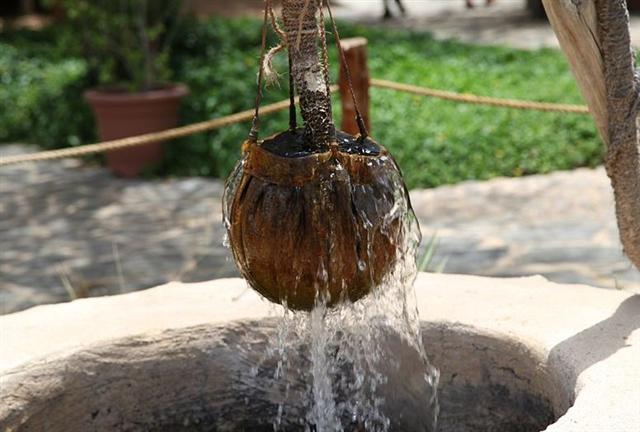 |
|
March 5 (428) |
6
(64) |
7
(365 + 65) |
8 |
9 |
10 |
11 |
|
DEC
30 (*284) |
31
(365) |
JAN 1
(430 - 64) |
2 |
3 |
4 |
5 |
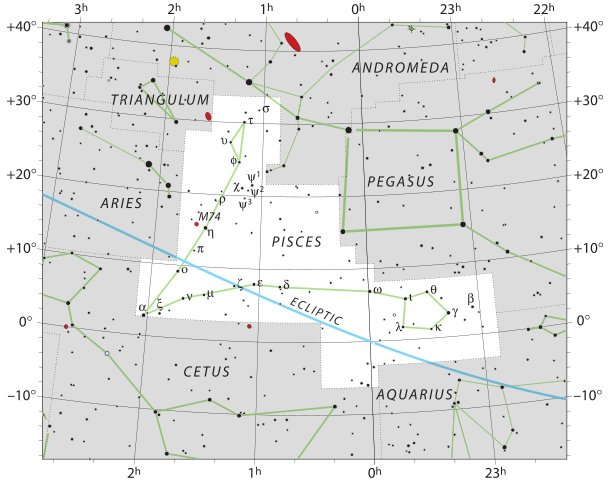 |
|
INVISIBLY CLOSE TO THE SUN: |
|
Sept
3 |
4 (64 + 183) |
5
(248) |
6 |
7 |
8 |
9 |
|
JULY
1 |
2 |
3
(248 - 64) |
4 (185) |
5 (3
+ 183) |
6 |
7 |
|
ANA-TIPU-4
(Upper-side-pillar - where the guards
stood)
MERAK (Loin, not Lion) =
β
Ursae Majoris
(166.2),
DUBHE (Bear) =
α
Ursae Majoris
(166.7) |
11h (167.4)
χ
Leonis,
χ¹
Hydrae (167.1),
χ²
Hydrae (167.3)
*167.4 - *41.4 = *126.0 |
AL SHARAS (The
Ribs) =
β
Crateris
(168.6) |
Al Zubrah-9 (Mane)
/
Purva Phalguni-11
(First Reddish One - Fig Tree)
ZOSMA (Girdle, not Belt) =
δ
Leonis
(169.2),
COXA (Hips) =
θ
Leonis (169.4)
*169.4 - *41.4 = *128.0 |
φ
Leonis (170.0),
ALULA
(First Spring of the Gazelle) =
ξ,
ν
Ursae Majoris
(170.5),
LABRUM =
δ
Crateris
(170.6) |
σ
Leonis (171.1),
λ
Crateris (171.6),
ι
Leonis,
ε
Crateris (171.9) |
γ
Crateris, π
Centauri (172.0),
κ
Crateris (172.5),
τ
Leonis (172.8)
GREDI (α Capricorni) |
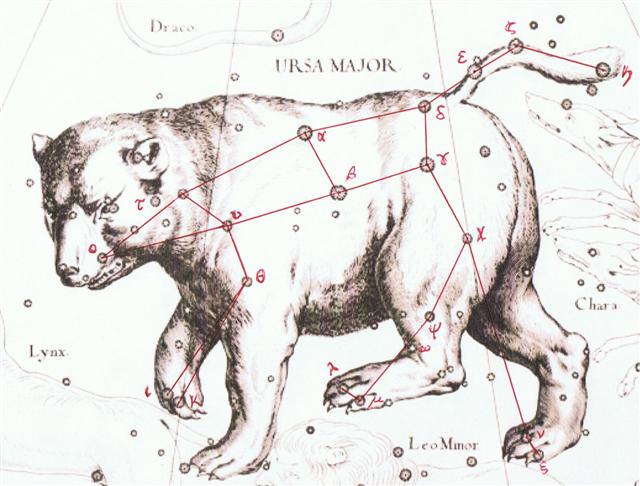 |
Then, after Gredi had culminated, the 'upstart'
would begin with a week ending at the place where the Tail of the Swan
(Deneb Cygni) culminated:
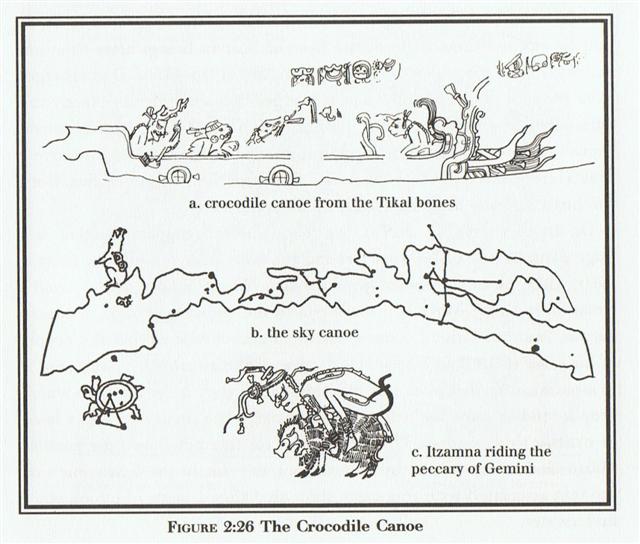
 |
 |
 |
 |
 |
 |
 |
|
Bb2-12 |
Bb2-13
(465) |
Bb2-14 |
Bb2-15 |
Bb2-16 |
Bb2-17 |
Bb2-18 |
|
|
|
kua
tuu te moa |
i to ika - eaha te ika ma
te maitaki |
hokohuki |
ma te henua |
hokohuki |
ma te maitaki |
hokohuki ma te henua |
|
VISIBLE
CLOSE TO THE FULL MOON: |
|
ο Gruis,
Snowball Nebula = NGC7662 Andromedae
(355.0), τ Oct. (355.3) |
No star listed |
ι Phoenicis (357.3),
ι Piscium (357.4),
λ Andromedae (357.9)
*316.0 = *357.4 - *41.4 |
λ Piscium (358.0),
MANUS
CATENATA = ι Andromedae
(358.1),
θ Phoenicis, ALRAI = γ
Cephei (358.4),
κ Andromedae (358.7)
*358.4 - *41.4 = *317.0 |
ω Aquarii (359.2),
78 Pegasi
(359.5) |
ψ Andromedae (360.1),
σ Phoenicis (360.4)
*360.4 - *41.4 = *319.0 |
γ¹ Oct. (361.4),
φ Pegasi
(361.7)
*361.4 - *41.4 = *320.0 |
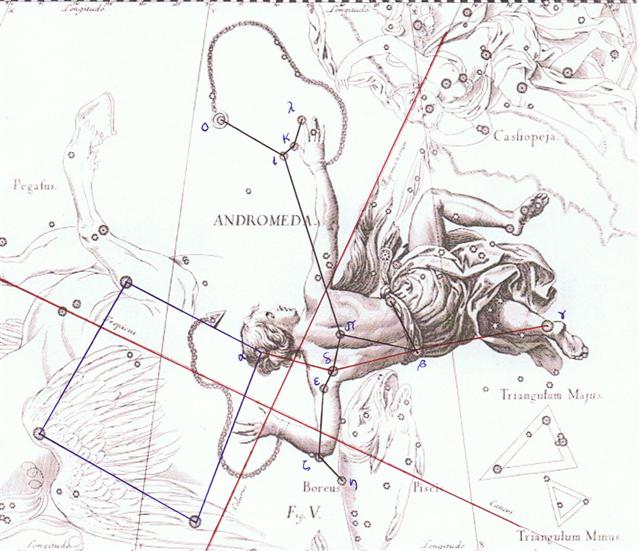 |
|
March 12 (70) |
(465 - 29 = 436) |
3-14 (365 + 72) |
15 (365 /
5) |
16 |
17 (440) |
18 (81 + 360) |
|
JAN 6 |
7 |
8 |
9 |
10 |
11 |
12 (377) |
|
INVISIBLY
CLOSE TO THE SUN: |
|
ο¹ Centauri (173.8) |
GIAUZAR = λ Draconis
(174.0), ξ Hydrae (174.3), ο² Centauri, λ
Centauri (174.8) |
θ
Crateris (175.0),
υ
Leonis (175.2),
ω
Virginis (175.3),
ι
Crateris (175.5) |
ο Hydrae (176.1) |
ζ Crateris, ξ Virginis (177.0), λ Muscae
(177.1), ν Virginis (177.2), μ Muscae
(177.8) |
Al Sarfah-10 (Turn)
/
Uttara
Phalguni-12 (Second Reddish One) /
Zibbat A.-16
(Tail of the Lion) / Shēpu-arkū sha-A-17
(Hind Leg of the Lion)
93 Leonis
(178.0),
DENEBOLA = β Leonis
(178.3),
ALARAPH (Unarmed) = β Virginis
(178.6) |
PHEKDA ('Thigh') =
γ
Ursae Majoris,
β
Hydrae (179.3),
η
Crateris (179.9)
DENEB CYGNI (α Cygni) |
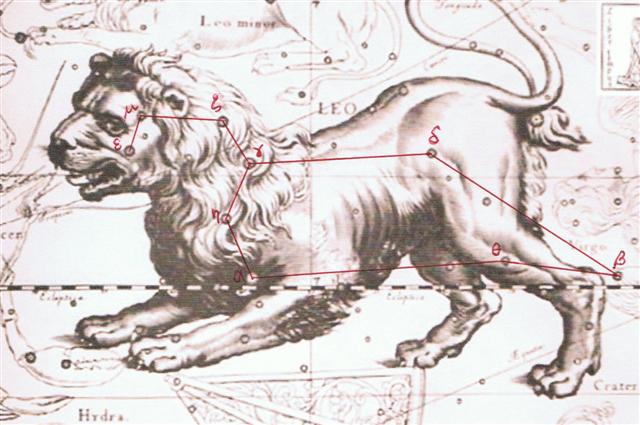
.jpg)
|
|
Sept 10 |
11 (254) |
12 |
13 (256) |
14 |
15 (258) |
16 |
|
JULY 8 |
9 |
10 |
11 |
12 |
13 |
14 (195) |
In September 16 (when the Sun arrived to the left 'Thigh'
of Ursa Major) only 9 days would remain to the equinox
(→ spring on Easter
Island). Although there were 29 days from JULY 14 (195)
to the end of line Bb2; 195 + 29 = 224 (AUGUST 12)
→ the last day before the
Creation of our present world:
|
Itzam-Yeh defeated |
28 May (148), 3149 BC |
|
1st 3-stone place |
21 May (141), 3114 BC |
|
Creation of our present world |
13 August (225), 3114 BC |
|
Och ta chan (Hun-Nal-Ye 'entered or
became the sky') |
5 February (36), 3112 BC |
|
21 May, 3114 BC - 5 February, 3112 BC
= 542 |
|
542 'happens to be' the sum of 365
days and 6 * 29½ nights. |
 |
 |
 |
 |
 |
 |
 |
|
Bb2-19
(471) |
Bb2-20 |
Bb2-21 |
Bb2-22 |
Bb2-23
(475) |
Bb2-24
(55) |
Bb2-25 |
|
kia iri vage
rei
- toona mea - kua hao te kahui |
e tagata
hati kava
era e |
kua haati ia e kava |
e iri
kava ia ra |
ka ki raua - ka
rotu i te rima - ki to
Rei |
|
VISIBLE
CLOSE TO THE FULL MOON: |
|
DZANEB (→ Deneb, Tail) =
ω
Piscium (362.4),
γ²
Oct.
(362.8)
*362.4 - *41.4 = *321.0 |
η Tucanae (363.0), ψ Pegasi (363.1),
32
Piscium
(363.2),
π
Phoenicis (363.4),
ε Tucanae (363.6), τ Phoenicis (363.9)
*322.0 = *363.4 - *41.4 |
θ
Oct. (364.4)
*323.0 = *364.4 - *41.4 |
Al Fargh al Thāni-25
(Rear Spout)
0h (365.25)
CAPH (Hand) =
β
Cassiopeiae,
SIRRAH (Navel of the Horse) =
α
Andromedae
(0.5),
ε
Phoenicis,
γ³
Oct.
(0.8) |
Uttara
Bhādrapadā-27 (2nd of the Blessed Feet) /
Wall-14
(Porcupine)
ο Oct. (1.3),
ALGENIB PEGASI = γ Pegasi
(1.8) |
χ Pegasi (2.1), θ Andromedae (2.7) |
σ Andromedae (3.0), ι Ceti (3.3), ζ Tucanae
(3.5), ρ Andromedae, π Tucanae (3.7) |
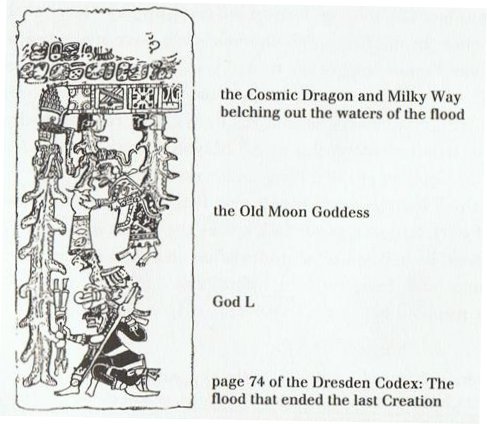 |
|
INVISIBLY
CLOSE TO THE SUN: |
|
No star listed (180) |
π Virginis (181.0), θ Crucis (181.5 |
12h (182.6)
ο
Virginis (182.1),
η
Crucis (182.5) |
ALCHITA =
α
Corvi, MA WEI (Tail of the Horse) =
δ
Centauri
(183.1),
MINKAR =
ε
Corvi
(183.7),
ρ
Centauri (183.9) |
PÁLIDA (Pale) =
δ
Crucis
(184.6),
MEGREZ (Root of the Tail) =
δ
Ursae Majoris
(184.9 |
Hasta-13 (Hand) /
Chariot-28 (Worm)
GIENAH (Wing) =
γ
Corvi
(185.1),
ε
Muscae (185.2),
ζ
Crucis (185.4), ZANIAH (Corner) =
η
Virginis
(185.9)
*144.0 = *185.4 - *41.4 |
CHANG SHA (Long Sand-bank) = ζ Corvi
(186.3) |
 |
|
Sept 17 (260) |
18 |
19 |
20 |
Equinox |
22 (*185) |
23 |
 |
 |
 |
 |
 |
 |
|
Bb2-26 |
Bb2-27 (58) |
Bb2-28 (480) |
Bb2-29 |
Bb2-30 |
Bb2-31 |
|
e tagata
rima oho - ki te honu
|
ka oho mai
te vae |
mai tae tu
mai - ki te inoino |
eie to
tahiri mo tahiri - o toga |
oho mai te
vae |
mai tae tuu
mai te tagata hura |
|
VISIBLE
CLOSE TO THE FULL MOON: |
|
No star listed (4) |
ANKAA =
α
Phoenicis,
κ
Phoenicis (5.0)
ALPHARD (α Hydrae) |
λ Phoenicis (6.3),
β
Tucanae (6.4)
*6.4 - *41.4 = *147.0 - 182.0 =
- *35.0 |
ANDROMEDA GALAXY (M31),
π Andromedae (7.7) |
ε Andromedae (8.2),
DELTA = δ Andromedae (8.4), SCHEDIR (Breast)
= α Cassiopeiae
(8.6), ζ Andromedae, μ Phoenicis (8.9)
*8.4 - *41.4 = *149.0 - 182.0 =
- *33.0 |
ξ
Phoenicis (9.0),
ρ
Tucanae (9.1),
DENEB KAITOS (Tail of the Sea Beast) =
β
Ceti,
η
Phoenicis (9.4), AL NITHĀM (String of
Pearls) =
φ¹
Ceti
(9.6)
*9.4 - *41.4 = *150.0 - 182.0 =
- *32.0
|
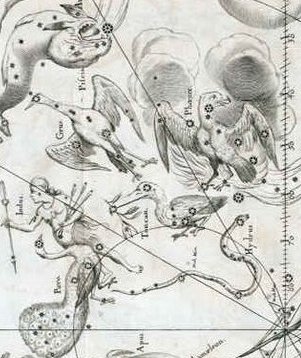 |
|
INVISIBLY
CLOSE TO THE SUN: |
|
INTROMETIDA (Inserted) =
ε
Crucis (187.4),
ACRUX =
α
Crucis
(187.5)
*146.0 = *187.4 - *41.4 |
γ
Com. Berenicis (188.0), σ Centauri (188.1),
ALGORAB = δ Corvi
(188.5),
GACRUX = γ Crucis
(188.7) |
γ
Muscae (189.0),
AVIS SATYRA (Bird of the Satyrs) =
η
Corvi
(189.3),
ASTERION (Starry) =
β
Canum Ven.
(189.5),
KRAZ
= β Corvi,
κ Draconis (189.7) |
α Muscae (190.2), τ Centauri (190.5), χ Virginis (190.7)
ALDERAMIN
(α Cephei) |
Al
Áwwā'-11 (The Barker) /
Shur-mahrū-shirū-18
(Front or West Shur)
SOMBRERO
GALAXY = M104 Virginis
(191.1), ρ
Virginis (191.4),
PORRIMA = γ
Virginis,
γ
Centauri (191.5)
*150.0 = *191.4 - *41.4 |
ι
Crucis (192.2), β Muscae (192.5),
MIMOSA = β Crucis
(192.9) |
|
Sept 24 |
25 |
26 |
27 (9 * 30) |
28 |
29 |
 |
 |
 |
 |
 |
 |
 |
| Bb2-32 (63) |
Bb2-33 |
Bb2-34 |
Bb2-35 |
Bb2-36 |
Bb2-37 |
Bb2-38 (490) |
| vaero rua - i haga
- te hihoga - ika |
i hoki ki te
tagata - ki te
vai |
kua
moe ko te tagata |
e tagata itiiti mea mau |
kua rere ko te tagata - i ruga
o te marama |
|
VISIBLE
CLOSE TO THE FULL MOON: |
|
ACHIRD (Woman with
Luminous Rays) = η Cassiopeiae
(10.7) |
Legs-15 (Wolf)
ν
Andromedae (11.0),
φ²
Ceti (11.1),
ρ
Phoenicis (11.2),
η
Andromedae (11.4)
*335.0 = *11.4 - *41.4 |
CIH (Whip) = γ Cassiopeiae, λ Tucanae (12.4), φ³ Ceti (12.6), μ Andromedae (12.8)
*336.0 = *12.4 - *41.4 |
φ4
Ceti (13.2) |
No
star listed (14) |
1h (15.2)
β
Phoenicis (15.1), υ Phoenicis, ι Tucanae (15.6), η Ceti, ζ Phoenicis
(15.7) |
Al Batn Al Hūt-26 (Belly of the Fish)
/
Revati-28 (Prosperous) /
1-iku (Field Measure)
MIRACH
(Girdle) = β
Andromedae,
KEUN MAN MUN (Camp's South Gate) =
φ
Andromedae
(16.0),
ANUNITUM = τ
Piscium
(16.5),
REVATI
(Abundant) = ζ
Piscium
(16.9)
REGULUS
(α Leonis |
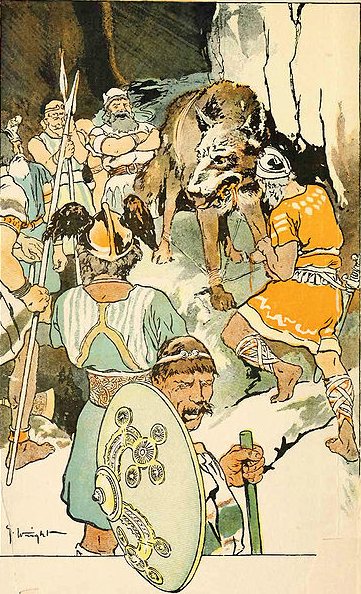
... At the beginning of 44 B.C. - when
Ceasar was still alive - the Senate decided
to raise statues of him in all the temples
and to sacrifice to him on his birthday in
the month Quintilis, which in honour
of him was renamed July. He was raised to
the status of a god (among the other gods of
the state) under the name Jupiter Julius.
Marcus Antonius, who this year was consul
together with Caesar, became high priest and
responsible for the ceremonies. In the
middle of February, at the time of the old
feast of Lupercalia [Lupus =
Wolf], he ran around naked and whipped the
Roman ladies with thongs made from goat-skin
[februa], in order to promote their
fertility ...
...
Though Andromeda has its roots most firmly
in the Greek tradition, a female figure in
Andromeda's place appeared in Babylonian
astronomy. The stars that make up Pisces and
the middle portion of modern Andromeda
formed a constellation representing a
fertility goddess, sometimes named as
Anunitum or the Lady of the Heavens
... |
|
March 31 |
April
1 (91) |
2 |
3 |
4 |
5 |
6 |
|
INVISIBLY
CLOSE TO THE SUN: |
|
No
star listed (193) |
κ
Crucis (194.4),
ψ
Virginis (194.5),
μ
Crucis,
λ
Crucis (194.6),
ALIOTH (Fat Tail) =
ε
Ursae Majoris,
ι
Oct.
(194.8)
*153.0 = *194.4 - *41.4 |
MINELAUVA =
δ
Virginis
(195.1),
COR CAROLI =
α
Canum Ven.
(195.3) |
δ
Muscae (196.5) ,
VINDEMIATRIX (Grape Gatherer) =
ε
Virginis
(196.8) |
13h (197.8)
ξ¹ Centauri (197.1), ξ² Centauri (197.9) |
APAMI-ATSA (Child of Waters) =
θ
Virginis,
ψ
Hydrae (198.5),
DIADEM =
α
Com. Ber.
(198.9) |
AL DAFĪRAH
(Tuft) = β
Com. Ber. (199.4)
*158.0 = *199.4 - *41.4 |
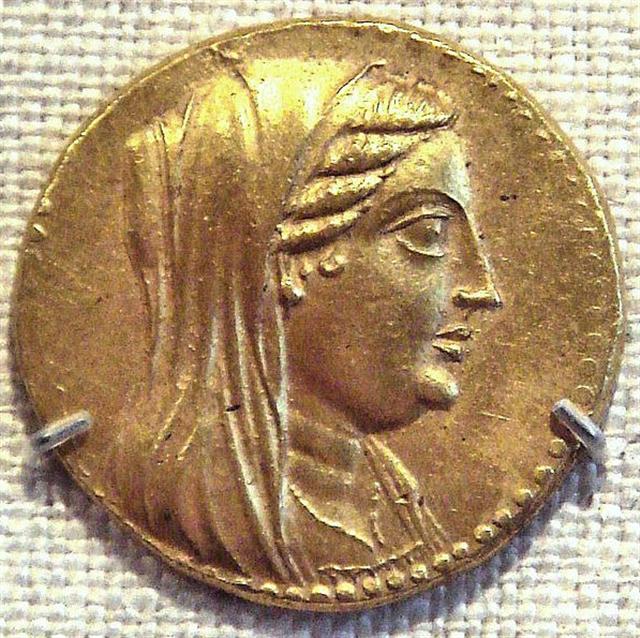 |
|
Sept 30 (3 * 91) |
Oct 1 (274) |
2 |
3 |
4 |
5 |
6 |
 |
 |
|
Bb2-39 (70) |
Bb2-40 (492) |
| ko te
manu kua rere |
ki to
heke |
|
Heke. Hakaheke, to pull down, to overthrow.
Mgv.: akaeke, to overthrow, to vanquish; heke, to fall
down, to fall to pieces: akaheke; akahekeheke, to
demolish. Mq.: heke, to crumble, to fall down; hakaheke,
to demolish, to pull down. Churchill. Kai heke, hakaheke,
to deflower.
Kahukahu o heke, an octopus hiding in his ink.
Mq.: ve'eve'e 'tentacules du heke'.
Barthel 2. Pau.: Heke, to purge. Mgv.: heke-toto,
hemorrhage. Ta.: hee, to purge. Mq.: heke, to drip.
Ma.: heke, id. Pau.: Hekeheke, elephantiasis. Ta.:
feefee, id. Mq.: fefe, id. Sa.: fe'efe'e, id.
Mgv.: Heke, eke, octopus. Ta.: fee, id. Mq.:
heke, feke, fee, id. Sa.: fe'e, id. Ma.:
wheke, id. Ta.: Hee, to slide, to swim. Sa.: se'e,
to slide, to shoot the breakers. Ha.: hee, id. Mq.: Hee
oto, to cut. Sa.: sele, id. Ha.: helehele, id.
Churchill. Ma.: 1. Migrate. Islands of History. 2. Rafter.
Starzecka. |
|
VISIBLE
CLOSE TO THE FULL MOON: |
|
ν
Phoenicis (17.4), κ Tucanae (17.6)
*159.0 + *182.0 = 341.0 |
No star listed (18) |
|
April
7 (97) |
8 |
|
INVISIBLY
CLOSE TO THE SUN: |
|
σ Virginis (200.4)
*159.0 = *200.4 - *41.4 |
γ
Hydrae (201.0),
ι
Centauri (201.4)
*160.0 = *201.4 - *41.4 |
|
Oct 7 (280 = 70 + 210) |
8 |
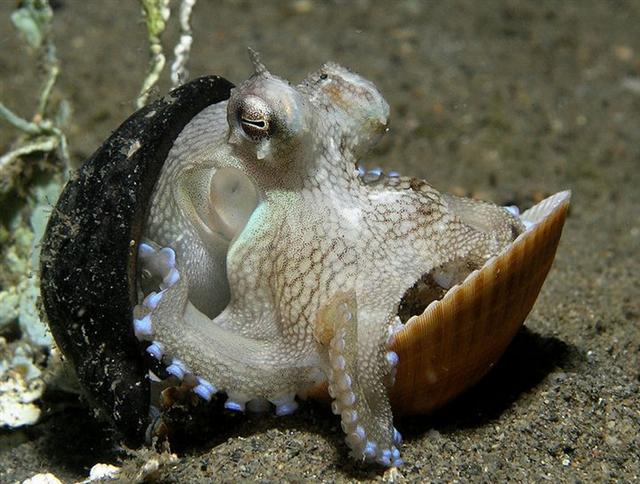
 |
 |
 |
 |
 |
 |
 |
|
Bb2-41 |
Bb2-42 (73) |
Bb2-43 |
Bb2-44 |
Bb2-45 |
Bb2-46 (498) |
Bb2-47 (78) |
| kua rere te
tagata |
ki te
huaga - o te kahui |
e tagata hua era e |
e vaha
ïa |
ma te
Rei |
ko
nuku |
ma te
ika - ko te ika kua here ai maro |
|
Kahui. Bunch; kahui maîka, bunch of
bananas. Vanaga. Bunch, cluster. T Mgv.: kahui, a bunch of
grapes or pandanus. Mq.: kahui, a bunch, cluster, troop,
assemblage. Ta.: ahui, heap, collection. (Cf. Sa.: fui,
a cluster of nuts; fuifui, a cluster of fruit, a flock of
birds.) Churchill. |
|
VISIBLE
CLOSE TO THE FULL MOON: |
|
ADHIL (Garment's Train) = ξ Andromedae
(19.3),
θ
Ceti (19.7) |
KSORA (Knee) =
δ
Cassiopeiae
(20.1),
ω
Andromedae (20.6),
γ
Phoenicis (20.8) |
δ
Phoenicis (21.5) |
υ
Andromedae (22.9) |
ACHERNAR (End of the River) =
α
Eridani
(23.3),
χ
Andromedae (23.6),
τ
Andromedae (23.9) |
ALSEIPH (Scimitar) =
φ
Persei
(24.5),
τ
Ceti (24.7) |
No
star listed (25) |
 |
|
April 9 |
10 (100) |
11 |
12 |
13 |
14 |
15 |
|
INVISIBLY CLOSE TO THE SUN: |
|
Al Simāk-12 (Lofty) /
Chitra-14 (Bright One) /
Horn-1 (Crocodile) /
Sa-Sha-Shirū-19
(Virgin's Girdle) /
ANA-ROTO-3 (Middle pillar)
MIZAR =
ζ
Ursae Majoris (202.4),
SPICA =
α
Virginis,
ALCOR = 80 Ursae Majoris
(202.7)
SADALMELIK (α Aquarii)
*161.0 = *202.4 - *41.4 |
71 VIRGINIS
(203.6) |
No
star listed (204) |
HEZE = ζ Virginis
(205.0),
SOUTHERN PINWHEEL GALAXY = M83 Hydrae
(205.7) |
ε
Centauri (206.3),
κ Oct. (206.4)
*165.0 = *206.4 - *41.4 |
No
star listed (207) |
τ
Bootis (208.2),
BENETNASH (Leader of the Daughters of the Bier) =
η
Ursae Majoris
(208.5),
ν
Centauri (208.7),
μ
Centauri,
υ
Bootis (208.8) |
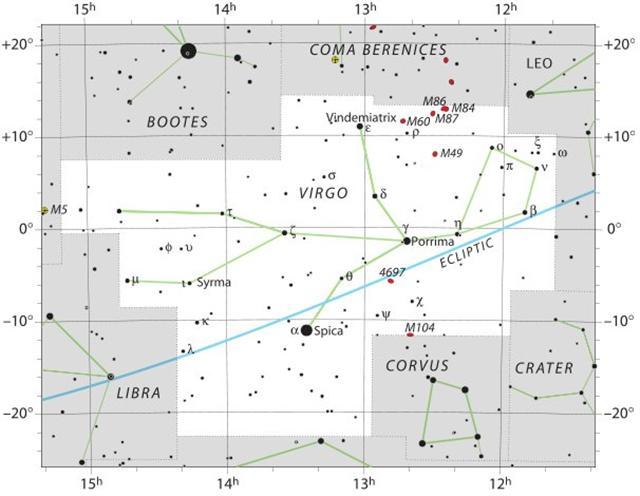 |
|
Oct 9 |
10 |
11 (284) |
12 |
13 |
14 |
15 (288) |
... The 15th day of October (288) was
the same day as that which the Pope Gregory XIII had
chosen for the beginning of his new calendar ... Gregory
dropped 10 days to bring the calendar back into
synchronisation with the seasons. Accordingly, when the
new calendar was put in use, the error accumulated in
the 13 centuries since the Council of Nicaea was
corrected by a deletion of ten days. The Julian calendar
day Thursday, 4 October 1582 was followed by the first
day of the Gregorian calendar, Friday, 15 October 1582
(the cycle of weekdays was not affected) ...
... The canoes of Ava Rei Pua and
of Hotu were seen near the (off-shore) islets. On the
fifteenth day of the month of October (tangaroa
uri) the canoe of Hotu and the canoe of Ava
Rei Pua landed. On the fifteenth day of the month of
October (tangaroa uri), Nonoma left the
house during the night to urinate outside. At this point
Ira called out to Nonoma, 'Look at the canoe!'
Nonoma ran, he quickly went to Te Hikinga Heru (a
ravine in the side of the crater Rano Kau) and looked
around. There he saw the double canoe way out near the
(offshore) islets, and the two (hulls of the canoe) were
lashed together. He ran and returned to the front of the
house. He arrived and called into the house: 'Hey you! This
canoe has arrived during the night without our noticing it!'
Ira asked Nonoma, 'Where is the canoe, which
you say is lying out there (in the water)?' Nonoma's
voice came back: 'It is out there (in the water) close to
the (offshore) islets! There it lies, and the two (hulls)
are lashed together.' The four of them (corrected for 'the
six of them') went out and picked up leaves (on branches) to
give signals. They picked them up, went and arrived at Te
Hikinga and saw the canoe. Raparenga got up,
picked up the leaves, took them in his hands, and waved,
waved,
waved, waved ... [E:75]

|

























.jpg)























